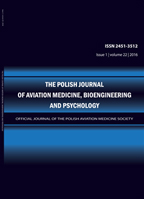2019, Volume 25, Issue 2
ASSESSMENT OF THE FREQUENCY OF FOOD PRODUCTS CONSUMPTION AND DIETARY SUPPLEMENTS BY MILITARY AVIATION PERSONNEL DEPENDING ON THEIR NUTRITIONAL KNOWLEDGE
AGATA GAŹDZIŃSKA1, MARTA TURCZYŃSKA1, PAWEŁ JAGIELSKI2
-------------------------------------------------------------------------------------------------
1Laboratory of Dietetics and Obesity Treatment, Department of Psychophysiological Measurements and Human Factor Research, Military Institute of Aviation Medicine
2Department of Nutrition and Drug Research, Faculty of Health Science, Jagiellonian University, Medical College
Autor korenspondencyjny: AGATA GAŹDZIŃSKA; Laboratory of Dietetics and Obesity Treatment, Department of Psychophysiological Measurements and Human Factor Research, Military Institute of Aviation Medicine; email: agazdzinska@wiml.waw.pl
Full text
Streszczenie
Introduction: Nutritional behaviour is the result of many factors, one of which is nutritional knowledge. A higher level of nutritional knowledge promotes proper nutrition, which is the main factor influencing health, nutritional status and psychophysical efficiency. The aim of the study was to determine the customary frequency of consumption of selected food products and dietary supplements by Air Force soldiers depending on their level of nutritional knowledge.
Methods: The study was carried out among 540 Air Force soldiers and 498 persons with complete data (32 women, 466 men; mean age 36.3±8.5 years) were included in the analysis. The FFQ food consumption frequency questionnaire was used to assess the frequency of food consumption. Nutrition knowledge was assessed on the basis of 32 statements on food and nutrition.
Results: The level of nutritional knowledge depended significantly on the education and age of the respondents. In the group of the surveyed soldiers, military pilots showed the highest level of nutritional knowledge, while the lowest level was shown by engineering and aviation services. The frequency of consumption of milk and natural dairy drinks, curds, eggs, wholemeal bread, coarse groats, fruits, vegetables, oils, nuts, seeds, poultry meat, rabbit meat, honey, wine and drinks increased significantly with the increase in the level of nutritional knowledge, while the frequency of consumption of margarines in cubes, margarines in cups, animal fats and cured meats decreased. Dietary supplements such as vitamin, mineral and vitamin-mineral preparations were significantly more frequently consumed by soldiers with a higher level of nutritional knowledge.
Conclusions:
- On the basis of the assessment of the frequency of consumption of products, a number of abnormalities were found among the majority of the surveyed soldiers of military aviation personnel.
- The results obtained confirm that a higher level of nutritional knowledge promotes healthy eating habits among the Air Force soldiers.
Food education is essential, especially among soldiers in the older age group and ground flying personnel.
Słowa kluczowe
nutritional knowledge, soldiers, frequency of consumption, military aviation personnel
